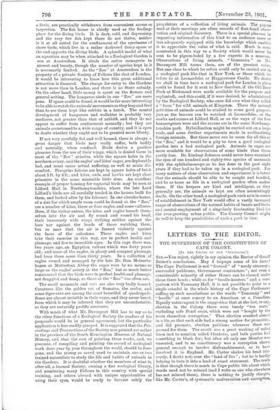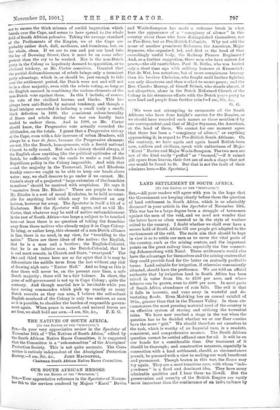LETTERS TO THE EDITOR.
THE SUSPENSION OF THE CONSTITUTION OF CAPE COLONY.
[TO THE EDITOR OF TEE "SPECTATOR."]
SIR,—You reject, rightly in my opinion, the Rector of Graaff Reinet's conclusions. May I impugn some of his facts? The Cape Parliament is not "formed" of "needy attorneys, successful publicans, Government contractors"; not even a considerable minority of either House can be classed under those three heads ; while as for " boodle-hunters " and a com- parison with Tammany Hall, it is not possible to point to a single scandal in the whole history of the Cape Parliament calling up such associations as the words " Tammany " and "boodle" at once convey to an American or a Canadian. Equally extravagant is the suggestion that at the last, or any, election in the Colony there were barely "ten seats," excluding safe Bond seats, which were not "bought by the most shameless corruption." That election resulted almost in a tie, so that each side had a strong motive for promoting, and did promote, election petitions wherever there was ground for them. The result was a great washing of soiled. linen (not to mention soiled blankets), and both parties had something to blush for; but after all only one Member was unseated, and in no constituency was a corruption shown general enough to involve disfranchisement, or to have involved it in England. Mr. Carter shakes his head (sin.. cerely, I doubt not) over the "land of lies "; but he is hardly- helping to turn it into a land of exact statement. The truth is that though there is much in Cape public life about which words need not be Minced (and I write as one who elsewhere has not minced them), there is nothing to justify charges, like M. Carter's, of systematic malversation'aid corruption, nor to excuse the thick miasma. of sordid imputation which WO& over the Cape, and seems to have spread to the whole field of South African polemics. Taking the average standard of the Parliaments of the Empire, we at the Cape are probably rather drab, dull, mediocre, and humdrum, but, on the whole, clean. If we are to run and put our head into the lap of Downing Street, then it must be on some other pretext than the cry to be washed. Nor is the non-Dutch party in the Colony so hopelessly doomed to opposition, or to electoral trickery, as Mr. Carter conceives. Granted that the partial disfranchisement of rebels brings only a transient party advantage, which is, or should be, just enough to tide over the settlement period, the Dutch were not and will not be in a clear majority, even with the rebels voting, so long BB the English succeed in combining the various elements of the non-Dutch vote against them. In this I include, of course, the vote of the civilised browns and blacks. This has always been anti-Dutch by natural tendency, and though a Bond intrigue succeeded in inducing a small (only a small) black defection in 1898, the consistent colour-brutality of Boers and rebels during the war can hardly have tended to endear them. And in 1898, as Mr. Carter should know, the Progressive vote actually exceeded the Afrikander, on the totals. I grant that a Progressive victory at the Cape, even with a fair increase of urban Members, will always be a tour de force, because the Progressive elements are not, like the Dutch, homogeneous, with a fervid national Church to rally round. But such a victory should always, if the English show anything like the political aptitudes of the Dutch, be sufficiently on the cards to make a real Dutch Republican policy in the Colony impossible. And with that —and the majority in the Transvaal, Natal, and Rhodesia frankly ours—we ought to be able to keep our heads above water : nay, we shall deserve to go under if we cannot. Mr. Carter's story of a projected "large extension of the franchise to natives" should be received with scepticism. He says it 'emanates from Mr. Rhodes." There are people to whom Mr. Rhodes is a sort of moral Krakatoa, to be held account- able for anything lurid which may be observed on any horizon, however far away. The Spectator is itself a bit of a Krakatoan. But the Spectator will agree, and so will Mr. Carter, that whatever may be said of native enfranchisement in the rest of South AfriCa—too large a subject to be touched here—at least there is no question of taking the franchise away from those natives who already enjoy it in Cape Colony. To bring, or rather keep, this element of a non-Dutch alliance in line, there is no need, in my view, for "truckling to the native." There are three ideas of the native: the English, that he is a man and a brother; the English-Colonial, that he is an inferior man; the Dutch-Colonial, that he is and must remain, in Church and State, " zwartgoed." The AA and third terms here are so far apart that it is easy to differentiate the middle term from the last without any risk of drawing nigh unto "Exeter Hall." And so long as this is done there will never be, on the present race lines, a safe Dutch majority ; there will be a fair balance. In short, the game of self-government is not up in Cape Colony; quite the contrary. And though martial law is inevitable while you have roving commandos which pick up exactly as many Dutch recruits as they can arm, I believe the self-reliant English manhood of the Colony is only too anxious, as soon as it is possible, to shoulder the burden of responsible govern- ment again. When peace is secured, and natural forces are
set free, we shall hold our own.—I am, Sir, &c., F. E. G.











































 Previous page
Previous page